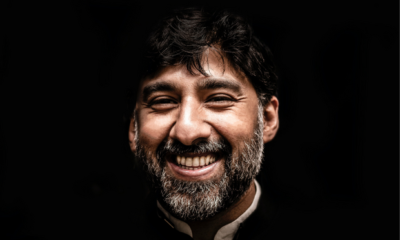Life
The Happiness Myth: Why Waiting for a Sign Might Be Holding You Back
Many people think that happiness will just happen when the stars align. The truth is, the more we wait, the more we miss out

We often believe in the Happiness Myth — that happiness comes from a big sign, a perfect moment, or some outside event. But what if waiting for this moment is what’s keeping you stuck?
Many people think that happiness will just happen when the stars align. The truth is, the more we wait, the more we miss out.
It convinces us to keep looking for something that doesn’t exist. Real happiness starts when you take control and stop waiting. It’s not a sign; it’s a choice. If you’re ready to break free from this myth, let’s dive in.
Understanding the Happiness Myth
We’ve all been sold the idea of happiness as a destination, a fixed point we strive to reach. But what if happiness isn’t something we find, but rather something we cultivate? This is the essence of the happiness myth.
The myth often suggests that happiness is the result of external circumstances: wealth, fame, or a perfect relationship. However, countless studies have shown that these factors have a limited impact on long-term well-being. Happiness is more closely tied to our internal state, our mindset, and our relationships.
The Psychological Impact of Waiting
Waiting can be tough. Whether you’re waiting for a message, a job, or even a sunny day, it can make you feel anxious and frustrated. This feeling often comes from the “Happiness Myth,” where we believe that good things will bring us happiness, but waiting can lead to doubts and sadness instead.
When we wait too long without any signs of what we want, we may feel helpless. This is called learned helplessness. It’s when we think nothing we do can change our situation. This mindset can hurt our mental health and make us feel stuck.
The Role of Procrastination
Procrastination can sneak into our lives when we wait too long for the “perfect” moment or signs to start something new. This waiting can feel safe, but it often leads us to miss out on opportunities for happiness.
Think about a student who puts off studying until the night before a big test, hoping for a last-minute burst of inspiration. Or consider someone who wants to get fit but keeps waiting for the “right time” to start exercising.
These common scenarios show how procrastination holds us back.
The Importance of Agency
Many people chase after happiness, but they often fall for the “Happiness Myth” that suggests happiness comes from luck or circumstances. However, the truth is that personal agency plays a crucial role in our happiness.
Personal agency means having the power to make choices in our lives. When we take control and make proactive decisions, we create our paths toward joy and fulfilment. Instead of waiting for good things to happen, we can choose to take action.
“There is no path to happiness; happiness is the path.” – Buddha
Case Studies and Real-Life Examples
Many of us find ourselves trapped in a cycle of striving for perfection, believing that it’s the key to ultimate contentment. This is the happiness myth, a misconception that often leads to disappointment and frustration.
Consider the case of Sarah, a high-achieving professional who always felt like she wasn’t doing enough. Despite her successes, she constantly compared herself to others and found herself chasing an unattainable standard of perfection. This relentless pursuit of the ideal led to burnout and a deep sense of dissatisfaction.
Another example is David, a man who believed that material wealth was the key to happiness. He worked tirelessly to accumulate wealth, but as his net worth grew, so did his anxieties and insecurities. David realized that external possessions couldn’t fill the void within him.
These stories illustrate a common theme: the happiness myth often leads us to chase after external validation and material possessions, believing that they will bring us fulfillment. However, true happiness comes from within, not from external circumstances.
Strategies to Break the Cycle of Waiting
Have you ever found yourself stuck in a waiting game, hoping for the perfect moment to act? This habit can keep us from finding true happiness and achieving our dreams.
Many people fall for the “Happiness Myth,” believing that joy will come only when the stars align. But waiting doesn’t lead to happiness; it leads to missed opportunities.
To break this cycle, start by setting small, actionable goals. Instead of waiting for signs or perfect conditions, take one tiny step toward what you want.
For example, if you dream of learning a new skill, commit to practising for just 10 minutes a day. This simple act can build your confidence and keep you moving forward.
Remember, taking action today is the key to unlocking your happiness. Don’t wait—start your journey now.
The Value of Mindfulness and Presence
In a world where everyone is rushing to get somewhere, many people fall for the “Happiness Myth.” They think that joy is found in the future—once they finish school, get a job, or buy a house. But what if happiness is right here, right now? Mindfulness teaches us to focus on the present moment, helping us to appreciate what we have today. By being mindful, we can let go of our worries about tomorrow and enjoy life more fully.
To cultivate mindfulness, you can start with simple techniques. Try taking a few deep breaths and noticing how your body feels. You can also take a mindful walk, paying attention to the sights, sounds, and smells around you.
Redefining Success and Happiness
Many people chase after what they think will make them happy. This often leads to a “Happiness Myth” where we believe success means having a big job, lots of money, or fancy things. But what if true happiness isn’t found in these places? It’s time to redefine what success and happiness really mean for you.
Instead of following what others say, you should create your own rules. Ask yourself: What makes me feel good? What goals do I truly want to achieve? By defining your own metrics, you can discover what really matters to you.
Remember, success is not a one-size-fits-all. It’s personal, and it should reflect who you are. So let’s break the “Happiness Myth” and find success in our own unique way.
In conclusion, the “Happiness Myth” can trap us in a waiting game. Many people believe they need a special sign to find happiness. They think happiness will come when they reach a goal or get something they want. But this is not true! Waiting for a sign can hold you back from enjoying life right now.
Instead of waiting, we can choose to be happy today. Happiness is not just about big moments; it’s also about small joys. Smiling at a friend, enjoying a sunny day, or helping someone can bring happiness into our lives.
By understanding the “Happiness Myth,” we can take action. We can focus on what makes us feel good each day. Don’t be a passive passenger in your life. Take the wheel and drive towards happiness. Let’s break free from this myth and create our own happiness.
Remember, the power to be happy is in our hands. So let’s start today! Choose to see the good around you and take steps toward joy. Happiness is not a distant sign; it is a choice we make every day.
Author Bio:
Life
Why Moving to a New City Can Change Your Mindset
Discover how moving to a new city boosts neuroplasticity, builds resilience, and reshapes your mindset

Relocation is always a challenge. Rebuilding and restarting your life requires you to step outside of your comfort zone. (more…)
Change Your Mindset
The Hidden Reason You Can’t Stay Consistent
If motivation keeps failing you, the real issue isn’t discipline. It’s the identity shaping your habits and long-term success.

Success often looks like a time-management problem. You buy a planner, set reminders, and hope that next week will be different. For a few days, it works. Then stress hits, motivation drops, and old patterns return. (more…)
Did You Know
How Skilled Migrants Are Building Successful Careers After Moving Countries
Behind every successful skilled migrant career is a mix of resilience, strategy, and navigating systems built for locals.

Moving to a new country for work is exciting, but it can also be unnerving. Skilled migrants leave behind familiar systems, networks, and support to pursue better job opportunities and a better future for their families. (more…)
-

 Business4 weeks ago
Business4 weeks agoWhy Entrepreneurs Should Care About AI Automation Testing
-

 Business4 weeks ago
Business4 weeks agoWhat Every Business Owner Should Know Before Investing in API Integration
-

 Business4 weeks ago
Business4 weeks agoWhy Smart Entrepreneurs Are Quietly Buying Gold and Silver
-

 Business3 weeks ago
Business3 weeks agoHow Smart Brands Use Instagram Data to Outperform Competitors
-

 Business3 weeks ago
Business3 weeks agoThe Paradox of Modern Work: Can Tech Make Us More Human?
-

 Change Your Mindset2 weeks ago
Change Your Mindset2 weeks agoThe Hidden Reason You Can’t Stay Consistent
-

 Entrepreneurs2 weeks ago
Entrepreneurs2 weeks agoThe Six Pillars That Ground Purpose-Driven Leadership (The Berenyi Life Blueprint)
-

 Change Your Mindset2 weeks ago
Change Your Mindset2 weeks agoThe Real Psychology Behind Quitting Too Soon





























